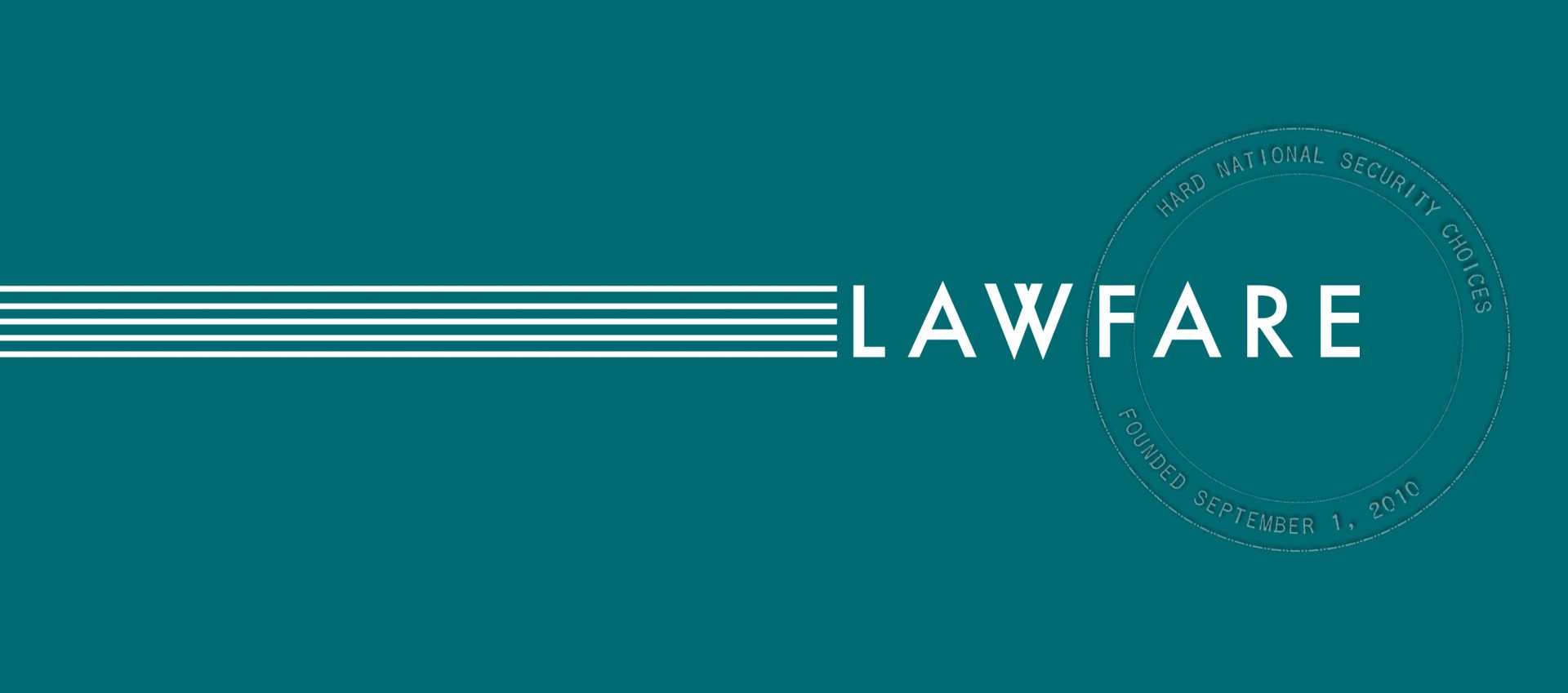The Week That Was: All of Lawfare In One Post
Your weekly summary of everything on the site.

Published by The Lawfare Institute
in Cooperation With

Benjamin Wittes discussed Attorney General Merrick Garland’s decision to appoint a special counsel to oversee whatever potential criminal matters that might arise out of the presence of classified documents in President Biden’s Delaware home and office space.
Natalie Orpett sat down with Scott R. Anderson, Paul Rosenzweig, and Wittes to discuss the appointment of Special Counsel Robert Hur to investigate caches of classified documents recovered in President Biden's Washington, D.C. office and Delaware residence:
Katherine Pompilio shared Garland’s statement announcing that he had appointed Hur as special counsel to oversee the investigations into the alleged improper storage of classified documents at President Biden’s office at the Penn Biden Center for Diplomacy and Global Engagement in Washington, D.C., and his home in Wilmington, Delaware.
Wittes sat down with Molly Reynolds to discuss Kevin McCarthy being elected as speaker of the House, days of chaos and voting, and the consequences of the concessions he made to get elected:
Roger Parloff began live-blogging the seditious conspiracy trial of five top members of the Proud Boys organization in his Proud Boys Trial Diary. The live-blog will run each day that the trial is in session.
Wittes sat down with Parloff to discuss the seditious conspiracy trial of five members of the Proud Boys and how it compares with the Oath Keepers case, differences in evidence in the two cases, whether the defendants can get a fair trial in the overwhelmingly Democratic District of Columbia, and more:
Wittes sat down with Anna Bower, Anthony Michael Kreis, and Tamar Hallerman to discuss the completion of Fulton County District Attorney Fani Willis’s grand jury investigation into election tampering in 2020:
Alan Rozenshtein and Anderson were joined by Reynolds and Tyler McBrien to discuss some recent and suspicious “copycat-ing” in the national security realm. They discussed the Jan. 6, 2021, insurrection in the United States and the Jan. 8, 2023, coup attempt in Brazil, grueling battles to unite conservative lawmakers behind a House speaker and rules package, and the recovery of classified documents in private offices of two U.S. presidents:
McBrien contrasted this week’s failed coup attempt in Brazil with the Jan. 6 attack on the U.S. capitol, and parsed out crucial discrepancies between the two events.
Curtis Bradley and Jack Goldsmith examined the legal efficacy of the U.S. government prosecuting entities owned by foreign states, in the context of Turkiye Halk Bankasi A.S. v. United States.
In a continuation of their previous analysis of Turkiye Halk Bankasi A.S. v. United States, Bradley and Goldsmith focused on the U.S. government’s argument, which holds that in criminal cases, the Foreign Sovereign Immunities Act (FSIA) does not address the immunity of foreign sovereigns. They also considered other avenues for regulating such immunity.
Stephanie Pell sat down with Bryan Cunningham to weigh the pros and cons of a federal backstop for the cyber insurance ecosystem, amid reports indicating that the Biden administration will release its cyber strategy in the coming weeks:
Shane Harris sat down with Jim Popkin to discuss his new book, “Code Name Blue Wren: The True Story of America's Most Dangerous Female Spy—and the Sister She Betrayed” which tells the story of Ana Montes, a a senior U.S. intelligence officer who spied on behalf of the Cuban government for almost two decades. Popkin discussed Montes’s entrance into the intelligence community, what drove her to become a spy, and the investigation that ultimately brought her to justice:
Kenneth Propp analyzed the Organisation for Economic Cooperation and Development’s recent Declaration on Government Access to Personal Data Held by Private Sector Entities, a documentation of current protections for individuals’ data among member nations.
Stewart Baker sat down with Dmitri Alperovitch, Rosenzweig, and Jim Dempsey to catch up on a month of cyberlaw news, including U.S.-China tech competition struggles, new medical device security requirements from December’s omnibus appropriations bill, Lastpass’s recent struggles with disclosures and hacking, and more:
Dempsey analyzed the recently passed appropriations bill which grants the secretary of health and human services the ability to regulate the cybersecurity of internet-connected medical devices and their related systems.
Hadrien Pouget examined the technical standard supporting the European Union’s AI Act, the first and largest effort to regulate artificial intelligence’s development and limit potential harms.
Jordan Schneider sat down with Tyler Cowen to discuss artificial intelligence, the challenges of writing about China, antisemitism, and more:
Timothy Heath considered recent challenges faced by China and examined how weakening state capacity, as a result, might incentivize military aggression against Taiwan as a diversionary tactic.
Kevin Frazier discussed the inadequate attention given to undersea cable system protection and provided policy recommendations for lawmakers to better protect this critical infrastructure.
Yuval Shany assessed a recently released judgment from the Israeli Supreme Court explaining its reasoning for approving the Israel-Lebanon Maritime Delimitation Agreement.
And Gabriel Schoenfeld reviewed Melvyn P. Leffler’s new book, “Confronting Saddam Hussein: George W. Bush and the Invasion of Iraq.”
And that was the week that was.


